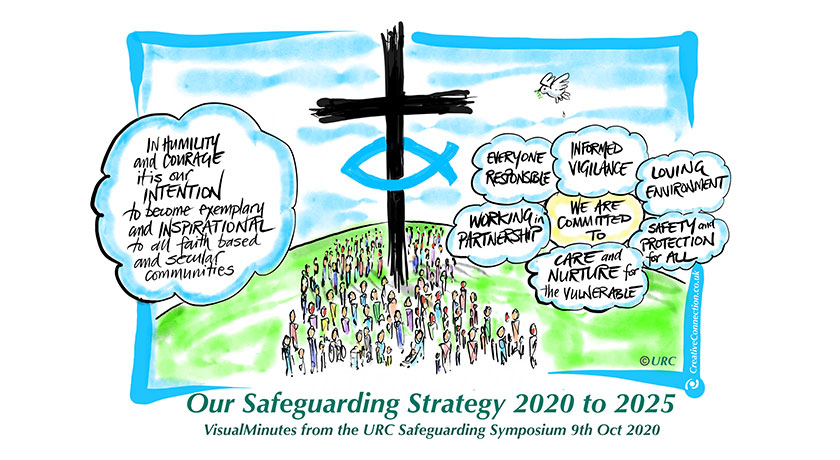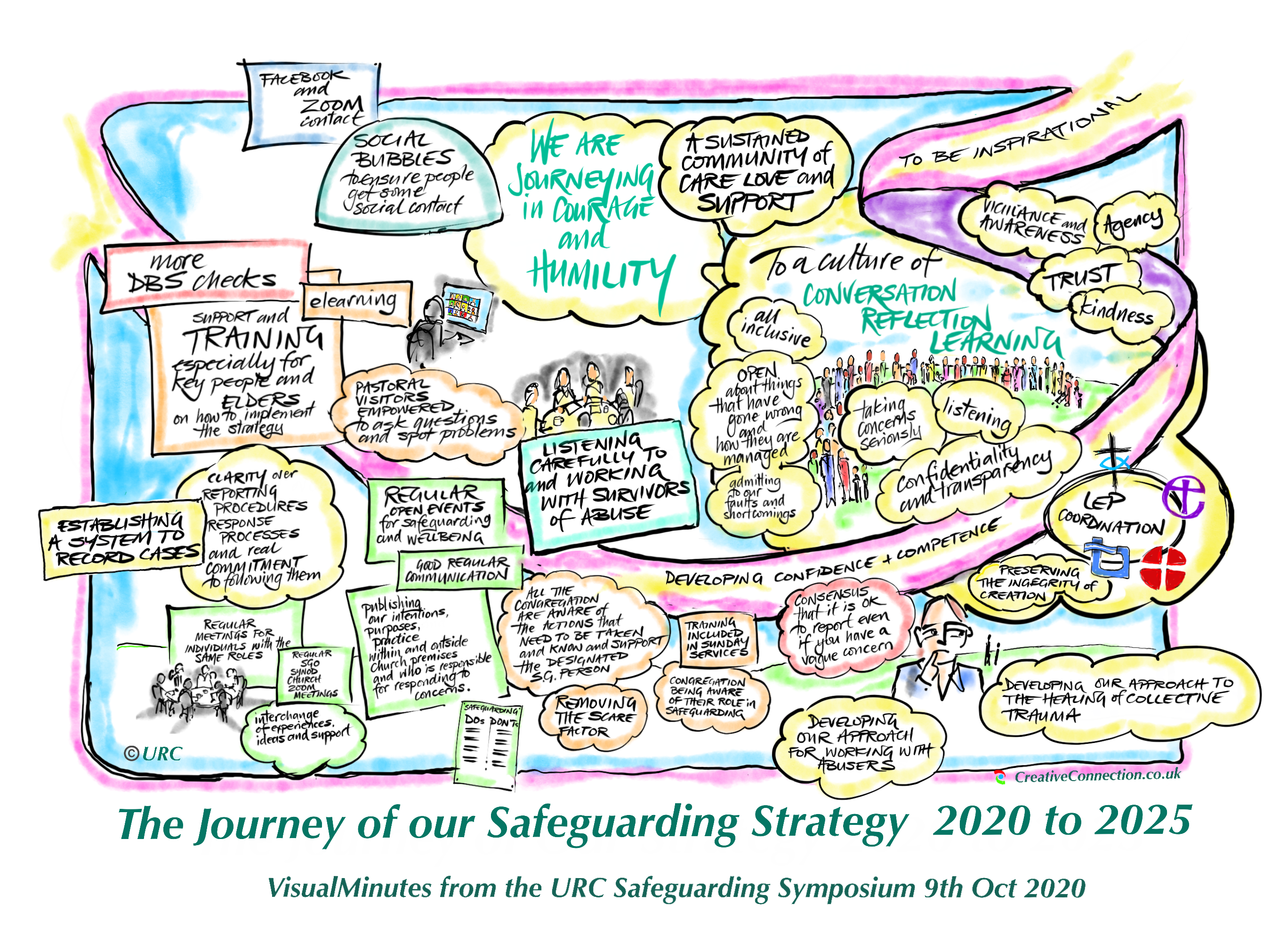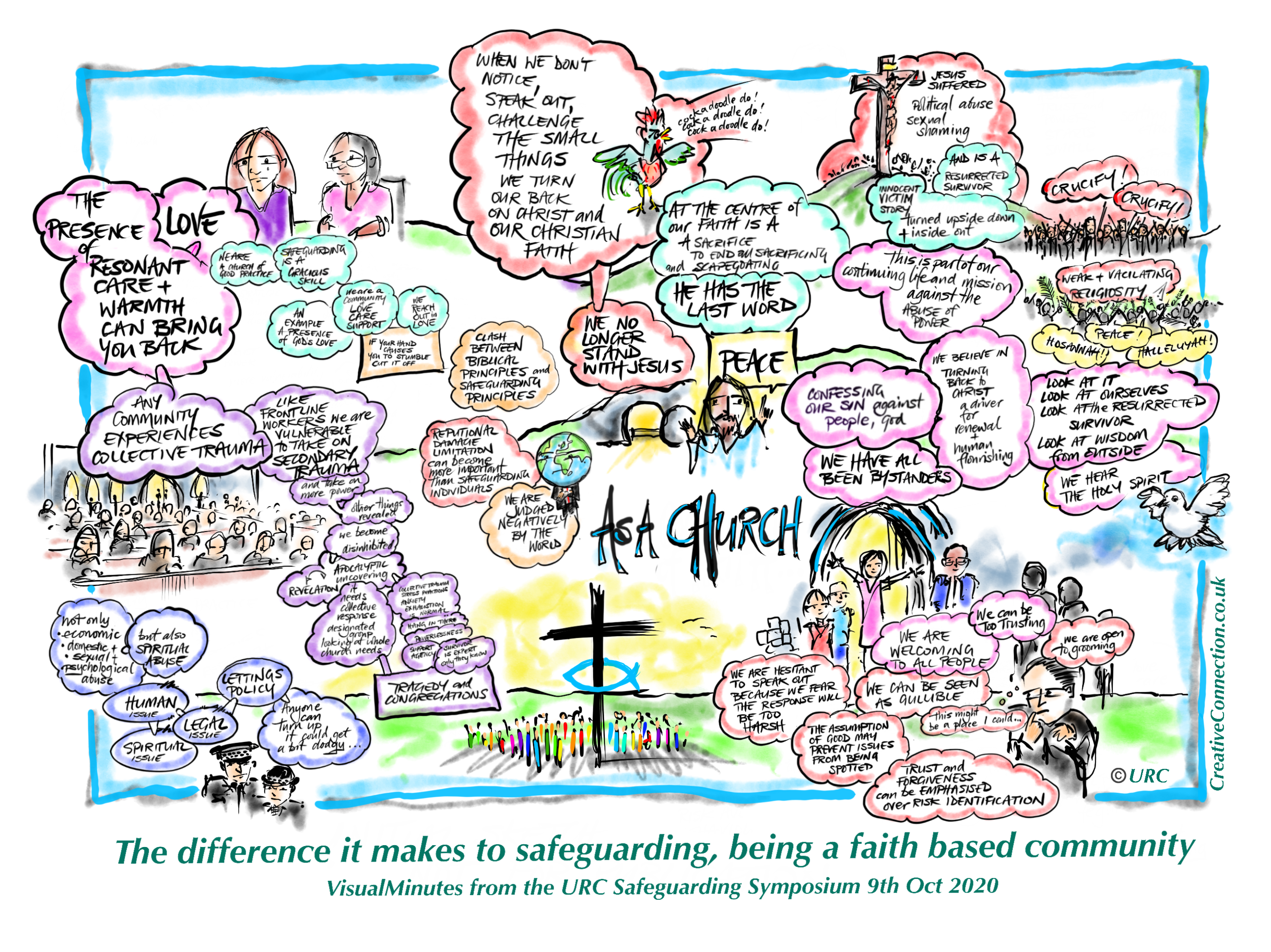 In October 2020, the United Reformed Church (URC) launched its five-year safeguarding strategic plan.
In October 2020, the United Reformed Church (URC) launched its five-year safeguarding strategic plan.
The plan requires all parts of the URC – it’s people, councils, committees and groups – to work together on six key objectives to ensure the Church provides a sustained community of care where everyone, particularly the most vulnerable, can find a place of love, pastoral care and support.
A dedicated webpage of resources from the launch can be found here.
In 2016, the URC undertook a wide-ranging review of its safeguarding work since the Church was founded in 1972.
The review included scrutiny of records and an invitation for people to contact the Church and report concerns. A major report then followed, with key points of learning and recommendations about what the Church could do to and improve its culture of safeguarding.
Following the conclusion of that the review, the Church took an important step in offering a heartfelt public apology to survivors of abuse, along with their families, supporters and communities. It also acknowledged that there were institutional failures and gave to the Safeguarding Advisory Group the task to review the implementation of the .
At the strategic plan launch, the Revd Dr John Bradbury, URC General Secretary, likened the heart of the story of the gospels to an act of “horrific abuse”.
“The cross was a moment of the abuse of political power. The abuse of religious power. An act of grotesque violence, and indeed sexual shaming,” Dr Bradbury said.
 “That might seem like a strange place for someone like me to begin a reflection on safeguarding. But if, as I do, and as a church we do, we believe that this event of the cross stands at the heart of who we are and the story we tell as Christians – not to take a long, hard look at it when we think about safeguarding is perhaps dangerously to avoid a difficult set of realities.
“That might seem like a strange place for someone like me to begin a reflection on safeguarding. But if, as I do, and as a church we do, we believe that this event of the cross stands at the heart of who we are and the story we tell as Christians – not to take a long, hard look at it when we think about safeguarding is perhaps dangerously to avoid a difficult set of realities.
“The one, absolute constant center of this story is Jesus. Son of God. Victim of this horrific act of abuse. One way of reading the gospel story is that of the account of a victim. We see everything from Jesus’ point of view – the innocent one oppressed. The perspective of the innocent victim of abuse is the foundational story of our faith.”
Dr Bradbury added that when the Church apologised, it was in essence “confessing its sin against our sisters and brothers, against the Gospel, and against Jesus.”
Dr Bradbury added that Jesus was not only a victim, but a resurrected survivor and as such, the Church is to be in some way the continuation of the life and ministry of this abused and crucified resurrected survivor, Jesus.
He went onto warn that if the safeguarding plan became a tick-box exercise of “things we must do to be seen to be safe” it could come across as “too little, too late.
Dr Bradbury continued: “If, however, it is a turning back to Christ, a turning back to place the story of the crucified resurrected survivor at the heart of our living in renewed forms of discipleship it becomes far, far more than that. It becomes a central driver of renewal of the whole life of the church leading to renewed human flourishing for all.”
Ioannis Athanasiou, URC Safeguarding Adviser, explained the six objectives of the plan:
1. Instil a safeguarding ethos of care and service within all congregations, synods and bodies.
2. Ensure initial and appropriate pastoral care and support to those who were impacted by safeguarding incidents and concerns.
3. Set up secure systems and processes of data and information handling and reporting safeguarding.
4. Ensure that the safeguarding policies and procedures are updated,
reviewed and implemented in practice throughout the URC.
5. Provide appropriate and accessible safeguarding training for all those
who are accountable for and working with children, young people and adults.
6. Encourage and build constructive partnerships with statutory, non
statutory bodies, other denominations and faith-based communities.
Of the plan, Mr Athanasiou said it was an “opportunity to foster a culture in which ‘every child and adult is treated with dignity and respect, whatever their circumstances’ with members, volunteers and workers who protect their rights, including those related to their data protection.”
 Although the URC – both centrally and in its local churches – is committed to ensuring that its churches, services and programmes are safe places for everyone, and has in place robust policies and procedures to ensure the welfare and protection of the children, young people and vulnerable adults who attend our churches and church-associated groups and events, Mr Athanasiou referred to the plan as a chance for change.
Although the URC – both centrally and in its local churches – is committed to ensuring that its churches, services and programmes are safe places for everyone, and has in place robust policies and procedures to ensure the welfare and protection of the children, young people and vulnerable adults who attend our churches and church-associated groups and events, Mr Athanasiou referred to the plan as a chance for change.
He added: “We have an opportunity to form and share a theological basis for safeguarding, emphasising this as an aspect of Christian love and care for others.”
Dr Bradbury explained why this is vital.
“Abuse does not start with the grotesqueness of the cross,” Dr Bradbury clarified. “It starts instead in small ways. It starts when we say ‘Oh, that’s just Fred being Fred’. When we write off the bullying raised voice in an Elders meeting as ‘that’s ‘just’ them being them’, when we write off the vaguely wandering hand that we’re pretty sure will never become anything else – when we do that, we begin to create an ethos and an environment that is not safe.
“When we find ourselves in a place where we would rather someone feel unsafe or insecure than challenge the one having that effect, we’ve gone awry. We’ve stopped clinging to the gospel account of the crucified resurrected survivor as the primary place our Christian identity is rooted, and we’ve allowed ourselves to become the weak and vacillating Roman politicians of the story, or the religious leaders of the story protecting their own interests, or part of that crowd shouting ‘crucify’. We no longer stand with Jesus.”
More than ever before, with the challenges presented by Covid-19 affecting our churches and society, it is critical for each part of the Church to see the safeguarding strategy as an opportunity to strengthen the life of the Church in the years to come.
Mr Athanasiou continued: “The safeguarding strategic plan offers a promising step to safeguard the integrity of creation, to walk the way safely all together and ensure the Church is a sustained community of care where everyone – particularly the most vulnerable – find a place of love, pastoral care and support.”
Published: 2 November 2020
